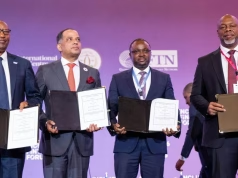The Federal Government’s indebtedness to the Nigerian National Petroleum Company Limited (NNPCL) for exchange rate differentials on Premium Motor Spirit (petrol) imports has risen to N7.74tn as of September 2024. This debt, accumulated during the period of fuel subsidy implementation, reflects the cost of maintaining a specific retail price range despite higher importation costs. The government is now working to settle the N7.74tn fuel subsidy debt within 210 days, according to documents presented to the Federation Account Allocation Committee (FAAC).
The N7.74tn debt covers the exchange rate differentials incurred between June 2023 and September 2024, when the government fully deregulated the downstream oil sector. Exchange rate differentials refer to the income accrued from the difference in value between two currencies at different times. In this case, the government supported fuel imports by covering the gap between the projected exchange rate and the actual costs incurred by the NNPCL for importing petroleum products.
A document presented to the FAAC revealed that the total exchange rate differential due was N10.499tn, but N2.756tn was recovered between November 2023 and September 2024, leaving a cumulative outstanding amount of N7.74tn. The government is now working to settle this debt within 210 days, with payments ongoing as of February 2025.
The debt accumulation began in June 2023, with an outstanding balance of N1.29tn, which increased monthly due to rising exchange rate differentials. By September 2024, the debt had reached N7.74tn, representing 14.07 per cent of the N54.99tn 2025 national budget.
The NNPCL’s claim for reimbursement has raised questions among industry experts. Wumi Iledare, an energy expert, questioned why the national oil firm is seeking reimbursement from the government when it sells oil in foreign currency on the government’s behalf. “If you look at the taxes paid by international oil companies, they are tax oil which NNPCL sells on behalf of the government and gives the government the dollar. So, it is very difficult for me to understand why the Federal Government has to return any money to NNPCL,” Iledare stated.
The FAAC committee has also expressed concerns over inconsistencies in revenue reporting by the NNPCL. Tunde Aregbesola, the Ogun State Accountant-General, highlighted a significant decline in revenue compared to previous months and questioned the accuracy of the figures. “There are concerns about the accuracy of the figures as reports suggest that NNPCL may still be reconciling the figures,” Aregbesola noted.
In response, FAAC Chairman Oluwatoyin Madein assured that the reconciliation process, handled by the Alignment Committee, is ongoing and covers up to December 2024. She emphasised the importance of addressing all relevant issues during the reconciliation to ensure accuracy and transparency.
The N7.74tn fuel subsidy debt underscores the financial challenges faced by the government following the deregulation of the downstream oil sector. While the removal of fuel subsidies was intended to reduce fiscal burdens, the accumulation of exchange rate differentials has created a significant liability. The government’s efforts to settle this debt within 210 days will be closely watched, as it has implications for Nigeria’s fiscal stability and economic growth.
Follow us on Instagram.
https://www.instagram.com/businessnewsng?igsh=ZXpweTdjOGF1ZXdu

























